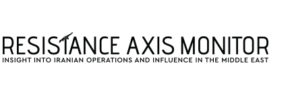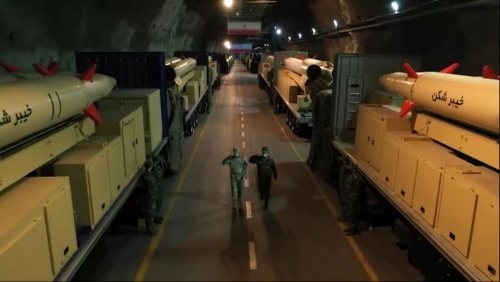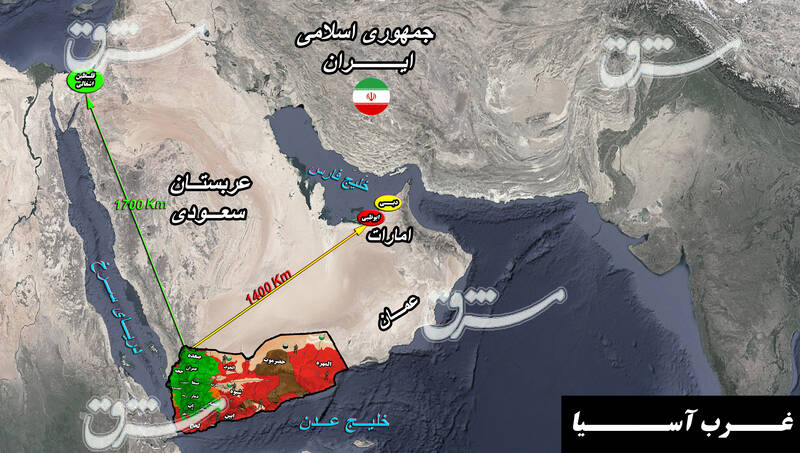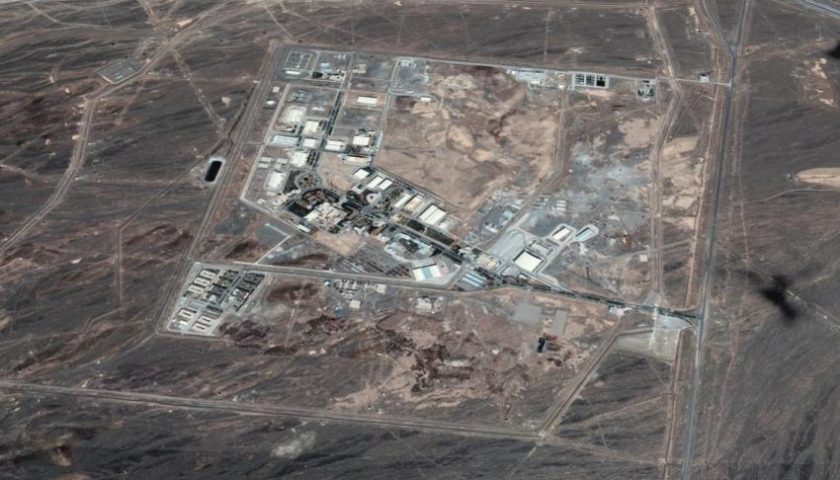The Resistance Axis Monitor News Bulletin aims to deliver periodic rounds ups of important developments from Arabic, Hebrew and Persian sources that have not been covered or covered as extensively in Western reporting. While the bulletin focuses on Iranian regional intervention and its proxies in the Middle East, its coverage extends beyond to include politics, military, society and culture of the northern tier of the region. Please subscribe on the right hand side to receive the latest News Bulletin as well as our analysis in your e-mail.
Iran
Conflicting Accounts About Electricity Blackout, Heavy Pollutant in Power Plants, Bitcoin Mining, Chinese Bitcoin Farms On 14 January, Reformist newspaper Arman-e Melli reported on blackouts and heavy pollution linked to bitcoin mining, in which China has a significant presence. For the past approximately last 20 days, 10 Iranian provinces including capital Tehran have dealt with suffocating pollution, far higher than usual. Officials eventually admitted that the reason for this pollution was injecting mazut, a heavy pollutant, to electricity plants. They have been unable to prevent blackouts that have spread to a number of cities, leading to 40 percent increase in vehicle accidents in Tehran.
The exact reason for the electricity shortage is unclear but some have pointed to Bitcoin mining placing a heavy load on the electricity grid. While some have blamed blackouts on higher household consumption during winter and low gas, a number of Energy Ministry officials have pointed fingers at illegal Bitcoin mining, which requires high electricity use. Legal permits to Iranians are restricted, though there is high financial incentive to mine without one.
While some officials have denied that Bitcoin mining is to blame for blackouts, business news agency Tejarat News reported on January 10 that Iran and China Investment Development Company operates large Bitcoin mining farms in free trade zone in Rafsanjan county, Kerman Province. Chinese cryptocurrency farms while Iranians face red tape to receive permit to mine is unusual, according to an Iran blockchain Association member. On 11 January, expatriate Radio Farda reported that an Iran-based journalist has raised questions that the Chinese investment has been undergoing with the cooperation of “a military institution,” indirect reference to the IRGC. An official in the Power Generation and Distribution Company (also known as TAVANIR) announced that it would temporarily stop operations at the farm in order to keep electricity flowing to residency units, contradicting an earlier statement that Chinese cryptocurrency mining was not interfering with the electricity grid.
When asked whether the administration has had a role in bitcoin mining problems, the President’s Chief of Staff Mahmoud Vaezi rejected that, saying that equipment are imported illegally, and that there was “pressure” on the administration to regulate bitcoin mining, which has happened recently. President Hassan Rouhani has ordered the Intelligence and interior ministries to investigate illegal mining, according to Vaezi. In reaction, hardline daily Kayhan said that Vaezi’s statement show that the “even if cryptocurrency mining has driven electricity shortage, the fault is on the administration for poorly managing the situation.”
Tehran Industrial Companies Managing Director Sadeq Parnian initially said that blackout to 2,300 industrial units was because of bitcoin and cryptocurrency, only to deny that he made the statement and say his statement was misinterpreted the following day. (Arman-e Melli, Eghtesad-e Bartar, Tejarat News, Radio Farda, Kayhan)
As Tehran Demands Seoul to Release $7 Billion in Assets Held Because of U.S. Sanctions, South Korean Delegation Fails To Negotiate Release of Tanker On 14 January, Reformist newspaper Aftab-e Yazid reported that South Korean officials have reported that their delegation dispatched to Iran failed to negotiate the release of a South Korean oil tanker seized by the IRGC in the Persian Gulf under the pretext of environmental pollution. The Islamic Republic has not provided any evidence that the tanker was polluting. Meanwhile, Iranian officials have uniformly demanded the South Koreans to release $7 billion in Iranian funds held in South Korean banks in order to comply with US sanctions on Tehran. Iranians said they were angry that South Koreans offered to sell ambulances. Seoul has insisted it is unable to release the funds without US authorization because the South Korean financial system is heavily dependent on the US financial system.
While discussing the South Korean talks, Mahmoud Vaezi, chief of staff to the President, said that Iranian funds across the globe held as a result of US sanctions would be released in the “next two to three months.” (Aftab-e Yazd) IRGC Weekly Editorial Discusses Turkish Rapprochement With Israel On 4 January, IRGC weekly Sobh-e Sadeq published an editorial discussing recent Turkish desire to improve ties with Israel. It said that the reasons may include Turkish concern that incoming President Joe Biden would be tougher on Ankara than outgoing President Donald Trump, so it wants to enhance its ties with the West through Israel. The editorial added that Turkey and Israel have become closer due to their mutual military support of Azerbaijan in the recent Karabakh conflict against Armenia, that Turkey wants to play catch up with other Arab countries that have boosted their ties with Israel, and that Turkey would desire Israeli help in managing its Mediterranean Sea disputes. The editorial concluded that Ankara’s move would damage its standing with Islamist movements inside and outside Turkey. (Sobh-e Sadeq)
Iraq
Kata’ib Hizbollah Official Offers to Train Insurrectionists in United States On January 13, Abu Ali Al-Askari, the security official of the Kata’ib Hizballah militia in Iraq, offered via his Telegram and now-suspended Twitter accounts to train U.S.-based insurrectionists to carry out attacks within the United States. Al-Askari’s message stated that, “the Islamic Resistance’s security advisers are at total readiness to provide advice and direct and indirect training to liberationist movements inside the Non-United States of America, and specific locations to do so will be secured.” (Telegram, Twitter)
Syria
Israel Conducts Widespread Airstrikes in Eastern Syria On January 12, Israeli warplanes carried out intense airstrikes in eastern Syria apparently targeting positions and arms depots of Iran-backed forces as the region is on high alert. At least 57 fighters were killed – including 14 Syrian troops, and the rest were Iran-backed fighters including 16 Iraqis and 11 Afghans – and dozens were wounded, according to Syrian Observatory for Human Rights (SOHR), a UK-based Syrian opposition war monitoring group. These numbers should be viewed skeptically, as SOHR has been known to lack activists on the ground, and has been prone to exaggerating Resistance Axis casualty numbers in these strikes. By contrast, Hizballah-affiliated Al-Mayadeen claimed that the strikes killed one Syrian soldier and wounded fourteen others.
On 14 January, state-linked Mehr News reported that the Quds Force, in an unusual move, has released a press statement denying “claims” about “casualties and martyrdom” of fighters in the “Zionist regime” airstrike. It added that these claims are “psychological operations” rooted in American and Israeli “fear” about “hard revenge” for last year’s assassination of then-force chief Qasem Soleimani. Also on the same day, Tasnim News, linked to the Islamic Revolution Guard Corps (IRGC), reported that not a single member of the mostly Afghan Fatemiyoun Division was killed in the airstrikes, and that several Syrian Arab Army officers were killed, according to an unnamed Fatemiyoun commander.
A senior U.S. intelligence official with knowledge of the attack told The Associated Press that the airstrikes were carried out with intelligence provided by the United States — a rare incidence of publicized cooperation between the two countries over choosing targets in Syria. The official said the strikes targeted a series of warehouses in Syria that were being used in a pipeline to store and stage Iranian weapons.
An unnamed Syrian military source issued a statement to SANA, giving few details on the strike or its outcome, besides saying that “the results of the strike are currently being investigated.” Meanwhile, the Syrian Foreign Ministry claimed the Israeli strikes coincided with “the terrorist, criminal, and oppressive activities of the SDF militia…in Hasaka and Deir Ezzor, backed by the United States administration,” proving their collusion. It failed to give any more details on the strike beyond the military statement.
Hizballah remained officially mum on the incident, contenting itself with a condemnation of Israel’s aerial incursions into Lebanon earlier that day, through its Gathering of Muslim Scholars in Lebanon – a body of pro-Hizballah Sunni and Shia clerics. Israel often conducts its strikes against targets in Syria from within Lebanese airspace. It’s Al-Manar outlet had no information to add on the incident, simply repeating the Syrian government’s official statements.
However, Al-Mayadeen claimed to have independently confirmed the Associated Press report’s information that the strike was a joint U.S.-Israeli operation. Per Al-Mayadeen’s “trusted battlefield sources,” U.S. forces secured Israeli recon operations of the targets in eastern Syria from their positions in Iraq. The report continued on, suggesting that these Israeli strikes were not trying to provoke the Resistance Axis into a war, but to pave the way for ISIS resurgence in the area – repeating the conspiracy theory that Washington was backing and arming the Islamic State. (Al-Mayadeen, Mehr News, Tasnim News, Associated Press, SANA, Al-Ahed, Al-Manar)
Lebanon
Hizballah Pays Lebanese Border Town’s Bill For Electricity Drawn From Syria On January 13 Hizballah’s official Al-Ahed newspaper reported that the group had offered 600 Million Lebanese Pounds (LBP) to the predominantly-Sunni Lebanese border town of Tufail, to repay 2 years of unpaid bills for electricity drawn from neighboring Syria. The offer was made by Hizballah’s Loyalty to the Resistance parliamentary bloc MP Ibrahim Al-Mousaoui, who told the town’s residents that the Shiite organization’s leadership had taken responsibility for paying for the power coming from Syria. Al-Mousaoui said his group was responding to the town’s request for assistance from Hizballah, saying “we are with you forever, this is the message from Hizballah’s leadership.” He added that his group would “not distinguish between Sunni and Shiite, or Syrian and Lebanese,” in aiding Tufail’s residents.
Al-Mousaoui was accompanied by Baalbek-Hermel’s former Sunni Mufti, sheikh Bakr al-Rifa’i, who lamented that Syria would have cut off Tufail’s electricity because of the Lebanese State’s failure to pay its dues for the past two years, “and Hizballah’s leadership took it upon itself to repay the debt.” (Al-Ahed)
Hizballah Condemns US Designation of Ansarallah as Terrorist Group On January 11, Hizballah issued a statement condemning the U.S. State Department’s Designation of Ansarallah – better known as the Houthis – as a Foreign Terrorist Organization. The group called the designation a “murderous American move aimed at demoralizing the Yemeni people.” The group’s statement said that Washington had undertaken the move to designate the Houthis because it “is not content to participate in, support, and back the cruel aggression against beloved Yemen,” referring to the Saudi war with Ansarullah. (Al-Ahed)
Hizballah Proceeds With “Agricultural Jihad” Plan Through Its Jihad al-Bina Organization On January 12, Hizballah’s Jihad Al-Bina organization distributed “thousands” of citrus, fig, and pomegranate saplings to residents of south Lebanon. This was done as part of one of several projects being launched by Jihad Al-Bina in line with Hizballah Secretary-General Hassan Nasrallah’s “Agricultural and Manufacturing Jihad” campaign, announced last year. Per Nasrallah, the program aims to promote agricultural and manufacturing self-sufficiency among Hizballah’s support base, amidst Lebanon’s ongoing economic crisis. (Al-Ahed)





